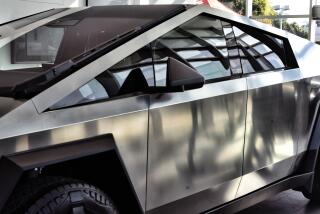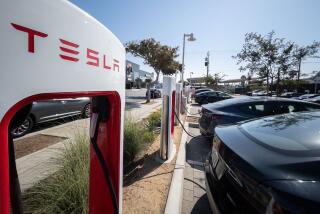Jaguar reveals its ‘Tesla fighter’: I-Pace electric crossover sales to begin this year in U.S.
Tesla’s had the luxury electric car segment all to itself since it introduced its original Roadster in 2008.
Now, years later, serious competition is swarming in.
On Thursday, Jaguar officially unveiled the I-Pace, an all-electric luxury crossover that goes up against the Tesla Model X sport utility vehicle and could lure other buyers who might otherwise be considering a Model S high-end sedan or the somewhat lower-priced Model 3.
“The I-Pace is the first real legitimate Tesla fighter,” said Jessica Caldwell, automotive analyst at Edmunds. “The small crossover segment couldn’t be hotter, and a stylish EV from a storied luxury marque like Jaguar is very likely to turn some Tesla shoppers’ heads.”
Later this year, Audi plans to release its all-electric e-tron crossover in Europe, and in the U.S. in the first quarter of 2019. The Porsche Mission E all-electric will hit the market late this year or early next.
Over the next two years, all major automakers will be issuing all-electric cars, luxury and otherwise. Several start-ups from Silicon Valley to Southern California to China will be torquing into the market as well.
The I-Pace goes on sale in Europe in July at a base price of about $87,000 before government incentives, though sources tell The Times the U.S. price will be lower. Jaguar dealers in the U.S. are currently taking orders and will begin receiving vehicles in the second half of the year, the company said.
“The car is important because it represents a larger trend” in the emerging luxury EV segment, said Brian Moody of Autotrader. “As larger automakers with broader customer bases and much larger distribution channels see the relative popularity of cars like the Model S, they naturally want to capture some of that audience — though likely on a larger scale.”
That’s bound to lift the mass market for lower-priced vehicles, such as the Chevy Bolt and Nissan Leaf, he said.
Jaguar first introduced the I-Pace as a concept car at the 2016 Los Angeles Auto Show. The car unveiled Thursday, in a highly polished production webcast available on Facebook, YouTube and elsewhere, doesn’t look much different from the concept.
The I-Pace, like the Tesla Model S and Model 3, has been called sleek, sexy and powerful, although it bears almost no resemblance to the long, low Jaguars of the past. Equipped with two Jaguar-designed electric motors, one for each axle, and a 90 Kwh battery, the I-Pace blasts from 0 to 60 mph in 4.5 seconds, according to the car’s official spec sheet. The stated range is 240 miles.
The livestream included British television personalities and a series of slickly produced videos that indicate Tesla faces not only a product challenge, but a marketing challenge as well.
Tesla has spent little on traditional marketing, relying on highly effective, low-cost strategies that include Chief Executive Elon Musk’s Twitter feed, a large and intensely loyal fan base and jaw-dropping publicity stunts like last month’s launch of a new Tesla Roadster into space orbit from atop a rocket launched by SpaceX, a company also run by Musk.
The I-Pace livestream, which Jaguar called a “show,” was threaded with millennial-style irony, bathroom humor and plenty of sexual innuendo, delivered mainly by 29-year-old British comedian Jack Whitehall:
“I’ve either turned on the heated seats or I’ve soiled myself.”
“The I-Pace will blow your tiny minds.”
“The car that electricity has been waiting for! The Jag bigwigs love that.”
In one scene, a Ricky Gervais-style skit used plastic buckets and water streams to explain how chargers juice batteries, complete with jokes about hoses and pool boys.
Carmakers spend many millions on marketing. Jaguar, Porsche, Audi and others are expected to go all out promoting their new electric vehicles, even if they account for only a tiny fraction of total sales.
Creative marketing has been one way Palo Alto-based Tesla, which had no existing business to finance new projects, has been able to limit expenses to get its ambitious projects off the ground.
The not-yet-profitable company continues to burn cash, counting on investment funding to keep it afloat until its car business turns out enough positive cash flow to ensure continuing operations. (Model 3 production remains constrained by what Musk calls “production hell.”) Investors will be watching whether the company’s guerrilla-style Silicon Valley marketing approach remains effective.
Tesla did not respond to a request for comment.
The company’s stock slipped $12.13, or 3.54%, to $330.93 by the end of trading Thursday.
Twitter: @russ1mitchell







